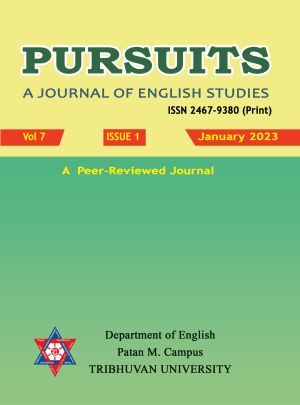Ecological Conscience in Arundhati Roy's The God of Small Things
DOI:
https://doi.org/10.3126/pursuits.v7i1.55373Keywords:
Ecological conscience, ecological sublimity, harmony, integration, ruptureAbstract
This paper analyses how the twin protagonists reflect their ecological conscience despite modern development in Arundhati Roy's The God of Small Things (1997) from an eco-critical perspective. Roy's narrative revolves around the frightening image of River Meenachal after the rapid development of the tourism industry in Kerala, India. The novel projects the interconnection of human beings, plants, and animals with River Meenachal. But the pollution into the lifeblood invites numerous hazards into nature. The encroachment toward the river occurs with modern materialistic development in India. Its immediate impact falls badly on plants, animals, and human beings. These issues in the novel invite a systematic exploration with the eco-critical insights proposed by Aldo Leopold and Paul W. Taylor. As a qualitative applied research, this paper draws on ideas from Leopold's concept of “Land Community” and Taylor's “Bio-centric Outlook”. An ecological conscience is the only way to get out of the complexities caused by modern development. Harmony and integration with nature render the vibration of ecological sublimity to the protagonists. Their reflection secures the ecological future of Kerala, India, as well as other parts of the world.




